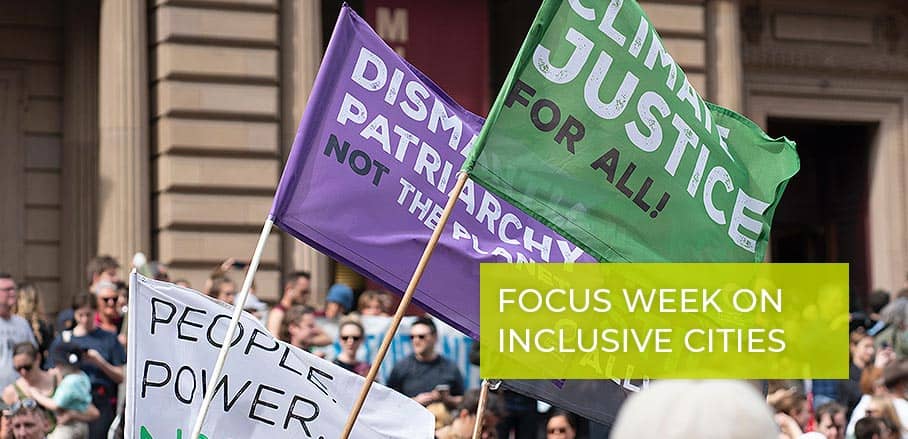Global Agendas, National Urban Policies – Does Anybody Care?
We are delighted to kick off our special focus week on Inclusive Cities with inputs by Billy Cobbett (Cities Alliance), Tobias Kettner (World Food Programme), and Tina Silbernagl (GIZ) on the question if and how global agendas, supra-national conventions, national urban policies and multilateral organisations and partnerships are critical instruments to promote value-based urban development.
The promotion of socially inclusive cities, which seek fair opportunities and full participation for all urban dwellers in all spheres of urban life, has been one of the key goals of international development cooperation for decades. The ‘right to the city’ as well as ‘leave no one behind’ have become widely accepted guiding principles. Recently however, the framework conditions for cities seem to be changing profoundly and more rapidly than ever before, with the COVID-19 crisis additionally aggravating inequalities within and among cities.
These rapidly evolving dynamics jeopardize progress on inclusive cities and call for a critical reflection of its concept and practices as well as for its repositioning on the international agenda. In the framework of ICLEI’s Daring Cities Conference 2020, senior urbanists and young urban professionals presented their views in the virtual side event “Inclusive Cities – The Next Generation”. Throughout the week, URBANET will present key insights from the event.

Local governance needs global agendas – and vice versa.
I have always been a strong advocate for the key role of city and regional governments – roles that have been made even more visible and relevant by the impact of the COVID-19 pandemic. However, in promoting the role of local and regional governments we must not make the mistake to privilege this over promoting the implementation of the radical transformation contained in the global agendas of 2015. I would like to see far more emphasis on collaborative governance, through which all tiers of government work with each other. This requires more attention to the importance of intergovernmental frameworks to guide this collaboration, but guided by the principle of subsidiarity – functions should always be performed at their lowest effective level.
To implement global agendas, we need to make local government careers more attractive.
Local government capacities are often limited due to a lack in key human resources. This is not only a major local problem, but constrains the implementation of global agendas, too. We need to close this capacity gap – the key indicator I would suggest is the extent to which local government becomes a popular, even preferred, career choice for the next generation of professionals.

To be truly transformative towards an inclusive and sustainable development, global agendas need to be rooted in universal values.
Universal values allow us to go beyond abstract aggregates to addressing discrimination and other root causes of inequality. First and foremost, individuals and their inherent dignity must be at the heart of development efforts in order for them to participate in the implementation of global agendas. Condensed, this requires development policies to adhere to the following three principles: human rights-based approach, leave no one behind, and gender equality and women’s empowerment.
The initiators of global agendas – the UN and other multilateral organisations – only have a strong future in the field of urban development if they open up more strongly to local governments.
This was the famous elephant in the room during Habitat III: how can multilateral organisations make sure that cities and local governments are adequately included in designing and implementing these global frameworks?
A key benefit of global agendas, supranational conventions and national urban policies is that they can be used to empower local governments and civil society at large. They do not do so inherently; they require action from within the country to make this happen.
They do so because they strengthen the alignment of international, national, and local policies, and they foster cooperation and collaboration by overcoming metropolitan fragmentation. However, they must address local governments, as those are closely connected to populations as the immediate provider of services – especially to groups most at risk of being excluded and marginalised. Only thus can global agendas, supra-national conventions, and national urban policies be critical instruments to promote value-based urban development.
Urbanisation is a prerequisite for a more inclusive society – despite cities often having much greater economic inequalities than countries as a whole.
Cities highlight extreme inequalities in close spatial proximity. At the same time, urbanisation provides a powerful potential for social mobilisation and freedom of expression, in particular for the marginalised and excluded, and for wider participation and influence in politics and policy. Yet it must not be forgotten that factors like gender, ethnicity, physical ability, age, migration and employment status determine access to the full benefits of urbanisation.

There are two main challenges in urban development that should shape our thinking and action.
First, inequalities and rifts going through societies, such as poverty, unequal opportunities, and conflicting opinions. If these divisions are not addressed adequately, they constitute a threat to urban peace and stability. Second, local governments are increasingly overburdened – not only with core deliverables, but with an ever-increasing number of complex demands, channelled towards cities by national governments, global agendas, and the international community. At best these demands run in parallel, at worst they are conflicting, forcing practitioners to make choices and prioritise – but how? On what grounds, which basis?
National Urban Policies and Global Agendas provide indispensable orientation for all actors concerned.
To realise inclusive cities and ensure “good” urban development, urban governance needs to be based on two premises. First, on a clear and unshakable value-based stance, which ensures that resource allocation is done consciously and with a bigger picture in mind. In practice, this means resources are channelled towards those areas and communities in a city that are lagging behind – in short, adhering to the principle of “Leave No One Behind”.
Second, on the acknowledgement that local governments are overburdened. This is not due to a lack of professional expertise, on the contrary. Yet, demands are growing increasingly complex and are often too manifold or conflicting. We need to take this challenge more seriously, and we need to look complexity right into its face in order to reduce it, or, when not possible, consciously manage complexities and conflicting demands.
National Urban Policies need to follow an integrated approach to effectively and inclusively navigate complex and challenging situations.
To properly deal with complex issues, we must accept the need to engage in negotiations between all stakeholders and their particular demands. As urban development practitioners we are lucky to have an approach that allows us to deal with complex scenarios and different demands at city and neighbourhood level. This is what we refer to as the integrated approach – with its range of aspects such as integration through the different tiers of government, accompanied by integrated funding streams, supported through integrated or transversal management structures and integrated urban development plans at city or neighbourhood level. So not just a fancy word, but something that has to, and can be, realised.
In order to stand a chance to maintain urban peace, we must rally behind a value-based stance. To ensure local governments remain functional in light of ever-growing demands and complexities, we must adopt the integrated approach at local and national level. Only thus are we able to look at cities and neighbourhoods in their entirety and navigate the rocky path to creating liveable cities for all.
- Creating an enabling environment for sustainable cities - 21. July 2016
